Photographs: Reuters
Overcoming the impact of global economic recession, Indian economy is poised to achieve 9 per cent growth in the current financial year itself driven by robust performance of agriculture and industry sectors.
In its mid-year analysis of Indian economy, the government said high inflation, which was a major concern, has started declining and hoped that it may fall to 6 per cent by March, 2011 from over 8 per cent now.
"The very rapid 8.9 per cent growth in GDP recorded in the first half of 2010-11 raises the possibilities of a faster recovery to the pre-crisis level. It is estimated that growth in 2010-11 will be 8.75 per cent with variation of 0.35 per cent on either side," the analysis said.
The government has, however, made a case for deepening strengthening of economic reforms to sustain high growth rate and raising it further to double digit level in the medium to long term.
The government expects divestment receipts from sale of PSU shares to cross Rs 40,000 crore (Rs 400 billion) target, the mid-year analysis said.
Immediately after tabling the analysis in Parliament, Finance Minister Pranab Mukherjee told reporters, "I am hoping that inflation will come down to 6 per cent by March 2011."
. . .
India to boom at over 9%; inflation to dip to 6%
Image: Finance Minister Pranab Mukherjee.Photographs: Reuters
In the economic survey this year, Mukherjee had projected a growth rate of 8.5 per cent with variation of 0.25 per cent on either side.
"Now why we have shifted the goal post from 0.25 to 0.35 per cent, one of the reasons is there have been certain uncertainties particularly recovery of Euro. And Euro has relevance both from viewpoint of FDI, investment and also from external trade, particularly export.
"A sizable percentage of Indian exports are destined towards Europe. Therefore, the recovery rather rapid and robust recovery of Euro is important from India's point of view," Mukherjee said.
Contrary to estimates by various think tanks, the economy during second quarter expanded by 8.9 per cent taking the overall growth rate to the same level in the first half and raised hopes of 9 per cent growth in the current fiscal.
On deepening of reforms, the finance ministry has underlined the need for further fiscal consolidation and steps to deal with external capital flows "which are posing some adjustment challenges" in the economy.
. . .
India to boom at over 9%; inflation to dip to 6%
Image: The Indian Parliament.Photographs: Reuters
The surge in capital flows, it said, has raised the question of domestic absorptive capacity which could lead to 'over heating' of the economy.
However, with current account deficit of 2.9 per cent in 2009-10, the capital flows at 4.1 per cent of the GDP have not been a 'matter of concern', the analysis said.
The Analysis called for improvement in infrastructure and and core industries, universalisation of elementary education and issues concerning climate change as move to deepen and strengthen economic reforms to sustain high growth levels.
FinMin wants transparency in road project auctions
Taking a bitter lesson from the way 2G spectrum was handed out, the Union finance ministry on Tuesday suggested a transparent auction system for awarding road projects to private developers with the government following a hands-off approach.
After facing flak on the 2G spectrum allocation in 2008, the government this year resorted to a transparent and hands-off auction system for the 3G radio waves allocations resulting in a huge collection of Rs 1.06 lakh crore (Rs 1.06 trillion) to the exchequer against the projections of Rs 35,000 crore (Rs 350 billion).
. . .
India to boom at over 9%; inflation to dip to 6%
Photographs: Reuters
In the mid-year analysis of the economy, the ministry said that during the first half of the current financial year only 691 km of roads have been completed against a target of 2,500 km for the year.
Contracts and concessions for only 3,051 km have been awarded against the annual target of 8,724 km, it said.
Expressing concern over poor performance of contractors, the review presented in Parliament said some of the problems can be overcome "if projects are awarded on the basis of a transparent and hands-off auction system."
It said in order to make the tendering process in road projects more effective, there is a need to put in place a transp*arent, well-designed system of auction whereby private developers are made to properly compete with one another with no involvement of the government.
The document said if the private developers are made to properly compete with one another with no involvement of the government, this would lead to the contractors offering projects on most cost effective terms.
. . .
India to boom at over 9%; inflation to dip to 6%
Photographs: Reuters
"Everything here depends on design of the auction system. If this is well-designed, the implementing agencies should be able to find developers who will take the projects with internal rates of returns as low as 12, 13 or 14 per cent," it said.
It identified delays in land acquisition and forest clearances as major stumbling blocks in road construction.
Road Transport Minister Kamal Nath who had set a target of building 20 kms of highways a day has run into problems with the Union environment ministry and also the Planning Commission.
While the Planning Commission had described his targets as over ambitious, the environment ministry has put on hold several of the projects including the road near Pench Tiger Reserve in Madhya Pradesh.
There have also been differences between the road transport ministry and the Planning Commission over the model concessionaire agreements.
. . .
India to boom at over 9%; inflation to dip to 6%
Photographs: Reuters
Termination of contracts often result in long-drawn litigation and delays.
Large capital inflows can hit India's exports
Large capital inflows leading to rupee appreciation can hit India's exports which have seen a smart recovery in the first six months of the current fiscal, a finance ministry analysis said.
"The main implication of large capital flows to India has been buoyancy in stock markets and appreciation of the rupee vis-a-vis the US dollar . . . the appreciating rupee can have adverse impact on the earnings of exporters and makes exports less competitive," mid-year analysis of economy said.
The analysis which was placed in Parliament said the widening trade deficit has also been a matter of some concern.
India's exports during April-September aggregated to $103.65 billion registering a year-on-year growth of 28 per cent.
. . .
India to boom at over 9%; inflation to dip to 6%
Photographs: Reuters
However, cumulative value of imports during the same period was $166.48 billion showing an annual expansion of 29.9 per cent.
The trade deficit for the first half of 2010-11 was $62.83 billion, up 33.2 per cent from the previous corresponding period.
Total capital inflows were of the order of $37.4 billion in the first half of the current fiscal. In the previous fiscal as a whole, these inflows were $53.6 billion.
"The surge in the capital inflows in recent years raises the question whether the inflows are in access of domestic absorptive capacity, which could lead to overheating of the economy," the review said.
However, there is a positive side to the phenomenon. The appreciating rupee "is an anti-inflationary tool as it makes imports of oil, which form 30 per cent of India's total import basket, cheaper."

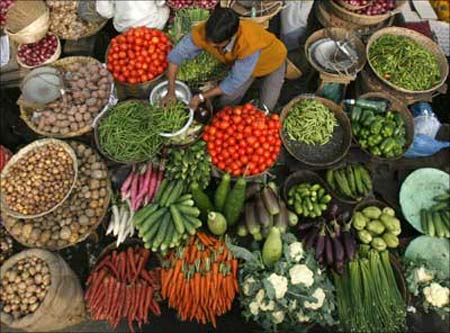
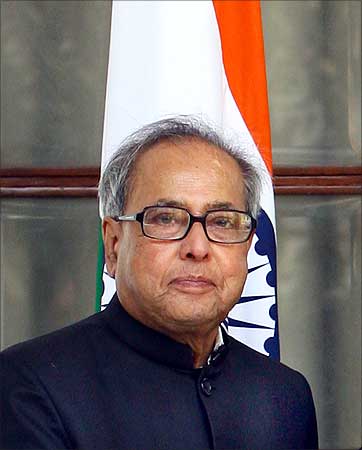
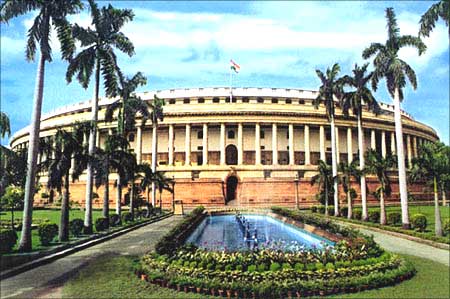
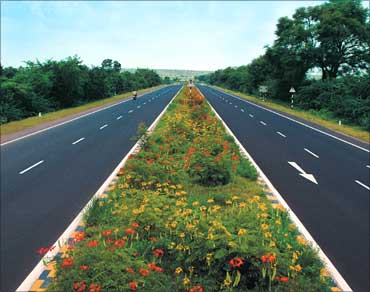
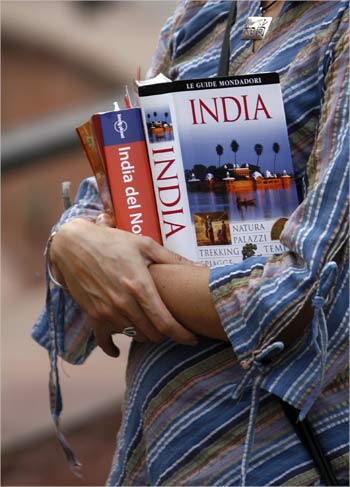

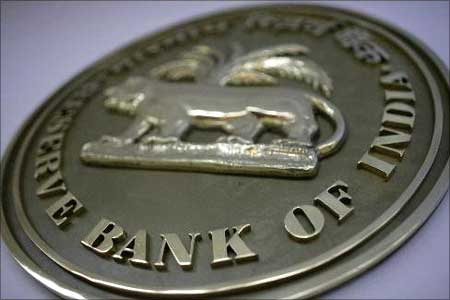
article